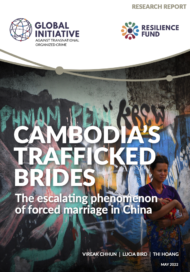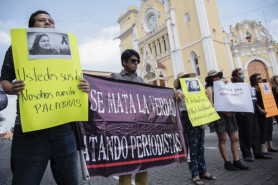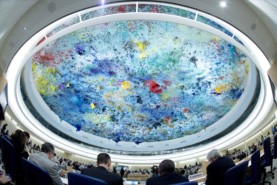Posted on 03 Jun 2020
Worldwide, police forces have faced unprecedented challenges during the COVID-19 pandemic. In this interview, Dr Om Mishra shares insights from the responses of the Delhi Police.
To gain a law-enforcement perspective on the response of the Indian police to the pandemic, the Global Initiative interviewed Dr Om Mishra, Joint Commissioner of Police for Delhi Police and a member of the Global Initiative Network.*
What are your main concerns about community-policing initiatives, in Delhi specifically and India in general, during the COVID-19 response?
As the most visible arm of any government, law enforcement has to rise to society’s emerging challenges. COVID-19 requires a paradigm shift in community policing. The various community-policing initiatives initiated in Delhi should be seen in this context. Medical experts have made it clear that social distancing and isolation are fundamental to containing COVID-19. The main focus of policing is to enforce these norms in the community through consent and persuasion.
Because social distancing was not achieved voluntarily, the government announced a mandatory lockdown. Delhi Police officers were entrusted with the responsibility of enforcing the lockdown in the city. Law-enforcement agencies in other states are also mandated to enforce the rules issued by the central government.
Delhi Police field officers launched a massive community-education and awareness drive on the serious health and legal consequences of violating social-distancing rules. Community members were persuaded to remain indoors. Resident-welfare associations, neighbourhood-watch committees, and other community platforms also participated in this exercise. Officers have also deployed drone cameras with speakers, asking residents to remain indoors and assess their compliance with lockdown guidelines.
Community members who have a genuine emergency that requires them to leave home are issued an online travel pass by local police officers. Special care has been taken to assist elderly citizens, women and children.
Has the response to COVID-19 changed the level of trust between law enforcement and the community? Has neighbourhood-watch capacity proved valuable or detrimental, and why?
Policing during COVID-19 has improved the trust between police and the community, as community members have seen officers’ humane, compassionate and caring side.
For example, the lockdown restricted the movement of taxis and other local transport services, as well as private cars. This made it difficult for women in labour to go to hospital, so the Delhi Police stationed patrol vans throughout the city. Until the third phase of the lockdown, police vans transported 843 women in labour to nearby hospitals to help ensure their babies’ safe delivery.
The community also appreciated various other services provided by the police during the emergency. The sudden lockdown restricted people’s ability to return to their home towns, which affected in particular the migrant population. Police took stranded people to shelter homes and provided them with food, in coordination with governmental and non-governmental organizations, without breaking the lockdown protocol.
Such gestures by police were appreciated by the community and were highlighted by local print and electronic media. Thus, dialogue with the community during the pandemic has added a new dimension to community-policing initiatives.
Neighbourhood-watch groups have provided valuable support to the local police in enforcing lockdown through consent and persuasion. In the long run, they have also helped to reduce the gap between police and community.
Has the police force been able to meet the need for personal protective equipment (PPE)? How are police leaders responding?
Both police leaders and the rank-and-file officers were quickly able to adapt to COVID-19 protocols. They are as vulnerable to the virus as any other person. Recognizing this vulnerability, especially for field officers, Delhi Police took adequate precautions to ensure that they don’t become infected.
All police officers were educated regarding health consequences of COVID-19 for themselves and their families, including precautions to be taken in the day-to-day discharge of their duties, such as continuous sanitization and protocols related to isolation. PPE was made available to all field officers. Police deployed at hospitals, isolation centres and in quarantine homes are fully equipped with PPE.
Separate quarantine centres have been set up for active field officers who have been exposed to COVID-19, where they stay when they are off duty. This is to ensure that they don’t expose their own family members to the virus.
All police personnel carry masks and other critical safety gear. Delhi Police has procured PPE in bulk, and ensures that it is distributed to all units as needed. At critical locations, sanitization tunnels have also been installed. There is no shortage of masks or gloves.
The Commissioner of Police and other top- and middle-level leaders regularly communicate with field officers. The Commissioner of Police directed that all Delhi Police units should establish a staff roster that places half the unit on duty with the other half in isolation. These two groups switch places every 10 days.
If you could recommend one community-policing policy to help officers accomplish the mission during the pandemic, what would it be?
An important step at this time would be to integrate the community more directly into the policing process. Legislation should be enacted that allows the police to nominate responsible citizens as grassroots volunteers. After proper scrutiny and verification, these volunteers can act as proxy police personnel, and as the eyes and ears of the police to help enforce government regulations. These volunteers should be incentivized with letters of appreciation and certificates by local governments when the pandemic is over. An ideal ratio would be one volunteer for every 20 households.
This initiative could help mitigate the disaster until a vaccine is available. Such volunteers would further strengthen the relationship between law-enforcement agencies and the community. After the pandemic, they could continue to support the police in other community services.
Several police districts in Delhi have already started such volunteer schemes. In one district, every police station has recruited 20 volunteers who will be assisting the local police in enforcing social distancing at grocery shops, pharmacies and similar locations. They will help the police to identify people who are violating lockdown rules and home-quarantine norms.
* Dr Mishra’s responses have been edited for length and clarity. Dr Mishra’s views are his own and do not represent the official position of any organization.
Cover: Nicolas Mirguet



